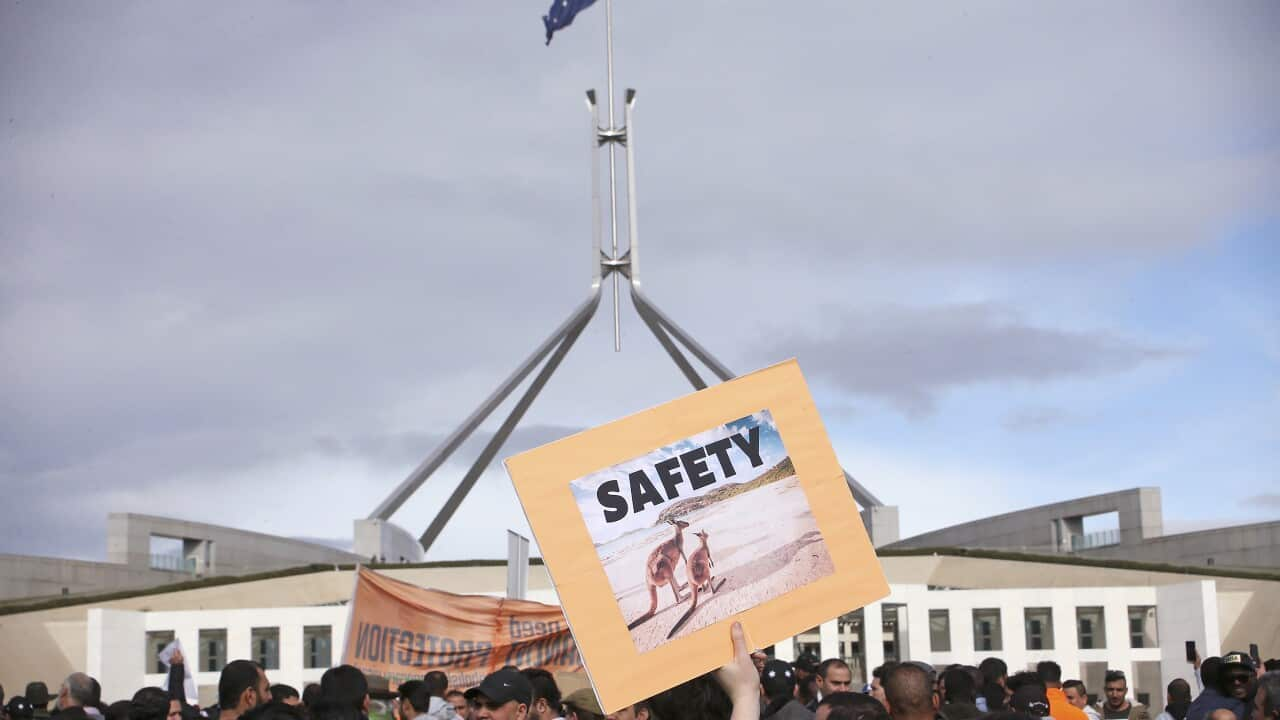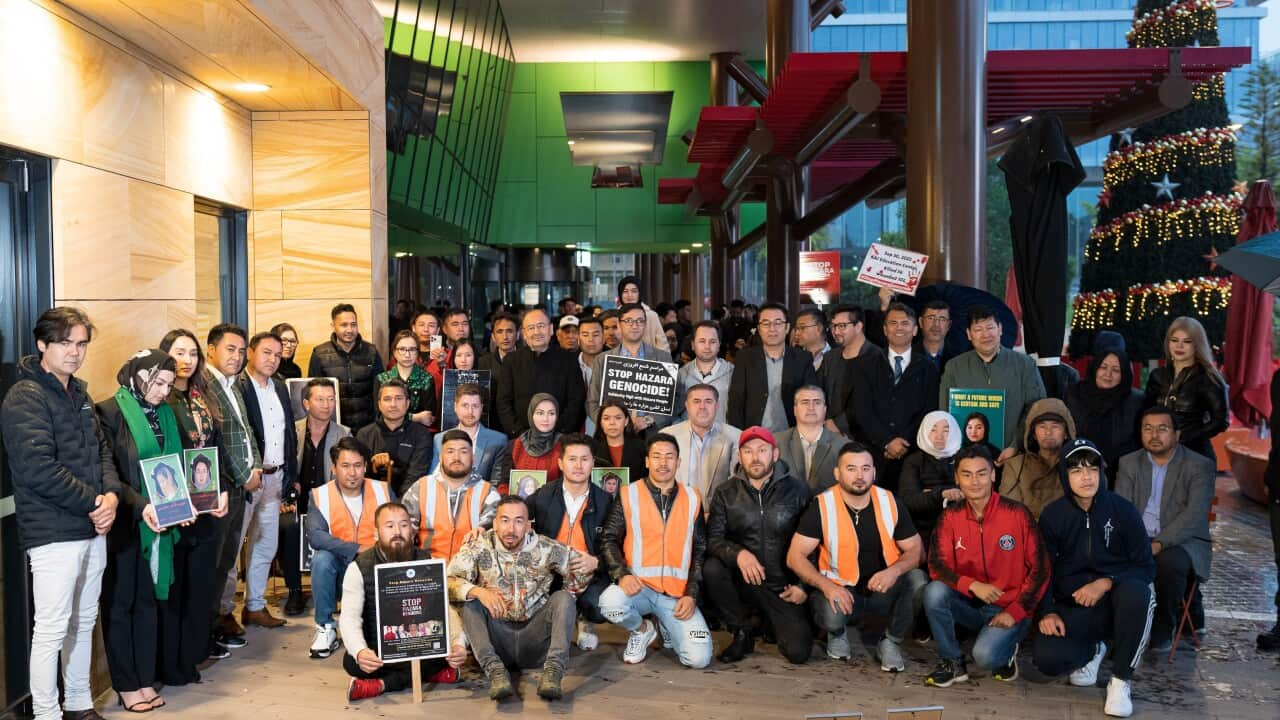As soon as news broke on Sunday that he and 19,000 fellow refugees are now allowed to apply for permanent visas, he says he was “...really shocked and couldn’t stop his tears”.
“More than myself, I was happy for friends who I’m always in contact with - they’re people who haven’t seen their families, their children in the last 10 years,” he said.
He said he touched base with each of the individuals who had shared “their life stories and pains” with him and “cried together on the phone” because it was a moment that changed their lives.

Immigration Minister Andrew Giles said it made “no sense” to keep people who worked and paid taxes “in limbo”. Source: AAP / Bianca De Marchi
Making the announcement on Sunday night, Immigration Minister Andrew Giles said it made “no sense” to keep people who are very much part of the Australian community “in limbo” any longer.
Mr Haidari fled Afghanistan in 2012 and was able to get to Indonesia through India and Malaysia with the help of people smugglers before jumping on a boat that was bound for Australia.

Zaki Haidari said around 5,000 Afghan refugees currently live on temporary protection visas. Source: Supplied / Supplied/Zaki Haidari
“The fact that we are alive today and survived this dangerous path is a miracle in itself,” he said.
“Like many other Hazara refugees who not only in Australia but have sought asylum in other countries around the world, we too couldn’t live in Afghanistan and wanted to go and live or seek asylum in a country where at least we have physical and mental safety,” he said.
But it's a far cry from the reality on the ground, to the point that some wished they had been killed by the Taliban’s bullets and bombs instead of coming to Australia where they were now subject to harsh visa conditions, he said.
“I know people who were saying, ‘in Afghanistan, the Taliban may shoot us or kill us with bombs which we may feel the pain for a few seconds and pass on, but unfortunately in Australia while we don’t have that physical pain, the psychological pain has tormented us so much that we’re now broken, we’re no longer complete human beings’,” he said.
“They were saying, ‘I wish we could bear the pain of the Taliban’s bullet for a few second and leave this world instead of suffering like today - we are alive, but we cannot live’.”
Mr Haidari, who now works as a Refugee Rights Campaigner for Amnesty International Australia, said living “in limbo” for over decade has taken a huge toll on him and other fellow refugees.
“Physically, we might have been safe - there was no one to kill us because we were Hazaras, or because we were Shias or because of the things we do, but mentally, we suffered a lot in these 10 years,” Mr Haidari said.
“Because everything was somehow temporary, we couldn’t even dream that one day we would be able to call Australia our country.
“Sadly, this torture and pain took many of our close friends away from us. Many couldn’t bear this pain and suffering anymore.”
Shabnam Safa, chairperson at National Refugee-led Advisory and Advocacy Group, says she was equally “overjoyed” when she heard the news.

Shabnam Safa said the community had fought hard for this change over the past 10 years. Credit: SBS Dari/Sam Anwari
“They have been just as much a part of the Australian community as anyone else but have been subjected to this punitive policy at the hands of our elected leaders, unable to start and live normal lives in Australia.”
Ms Safa thanked the Labor government for delivering on its election commitment and for “starting to clear this stain on our collective humanity and ending this cruelty”.
“I hope this is a turning point in Australia’s deliberately designed inhumane asylum policies as we have much to address,” she added.
“Today, I am also thinking of the many members of the community who are no longer with us to witness this, who lost or ended their lives under this cruelty.”
Thousands still in limbo
The change only applies to those refugees who hold or have applied for TPV and SHEV before 14 February 2023 and who have arrived in Australia prior to the start of Operation Sovereign Borders in late 2013.
This means that around 12,000 people who were also among the so-called Legacy Caseload and hold Bridging Visas still face visa uncertainty.
Ms Safa said she hoped that the Albanese government would also provide them with pathways to permanency.
“I am hopeful that the government will also prioritise those still living in uncertainty who were failed by this policy, other than the 19,000 and others who have been forced on to Bridging Visas,” she said.
The government also said that around 2,500 people whose temporary visas have been cancelled or refused are expected to “depart Australia voluntarily”.
Mr Haidari said from now on, Amnesty International Australia’s advocacy will be focused on those who live in Australia on Bridging Visas.
“Around 5,000 people from Afghanistan currently live on TPVs and SHEVs in Australia,” he said.
“And unfortunately, some Afghan nationals also hold Bridging Visas for whom the government is yet to announce any plans so our advocacy will now turn to them so that they also get a fair process and are able to apply for permanent visas.”
SBS Dari sought comment from the Department of Home Affairs but had not received a reply by time of publication.



